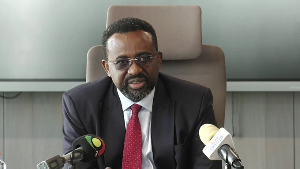As part of measures to strengthen financial stability and sustain the country’s recent macroeconomic gains, the Bank of Ghana (BoG) will institute a new set of prudential and supervisory directives for the banking sector.
Addressing chief executives of banks at a post-Monetary Policy Committee (MPC) engagement in Accra this week, Governor Dr. Johnson Asiama indicated that the new regulatory framework is aimed at aligning Ghana’s banking supervision with international best practice while ensuring the sector remains resilient as monetary policy shifts toward supporting growth.
The new measures include directives on Bancassurance, Large Exposures and Credit Concentration Risk Management. The central bank will also in coming months issue exposure drafts covering Liquidity Risk Management, Interest Rate Risk in the Banking Book, Stress Testing and Recovery Planning.
These policies, Dr. Asiama explained, are designed to deepen prudential oversight and enhance risk management practices across the industry.
Also, the transition period for compliance with the Outsourcing Directive has been extended to end-December 2025 following consultations with the Ghana Association of Bankers – but he cautioned that this will be the final extension.
The Outsourcing Directive sets out conditions under which banks may delegate key functions – such as IT services, call centres or data processing – to third-party providers. The framework aims to prevent operational disruptions and strengthen regulatory oversight of outsourced services.
This renewed regulatory drive comes as the economy continues to improve following years of fiscal and price instability. Headline inflation fell to 9.4% in September, marking the first single-digit print in four years and ninth consecutive monthly decline.
Economic growth has also gathered momentum, with GDP expanding 6.3% in the second quarter and non-oil GDP rising 7.8% – supported by strong activity in the services and agricultural sectors.
“The return to single-digit inflation marks a new chapter in our recovery, but it is not the end of the story,” Asiama said.



